2012年中考英语二轮复习课件教材突破篇(人教版)Period 1 【Units 1-6, Book 7A】
文档属性
| 名称 | 2012年中考英语二轮复习课件教材突破篇(人教版)Period 1 【Units 1-6, Book 7A】 |
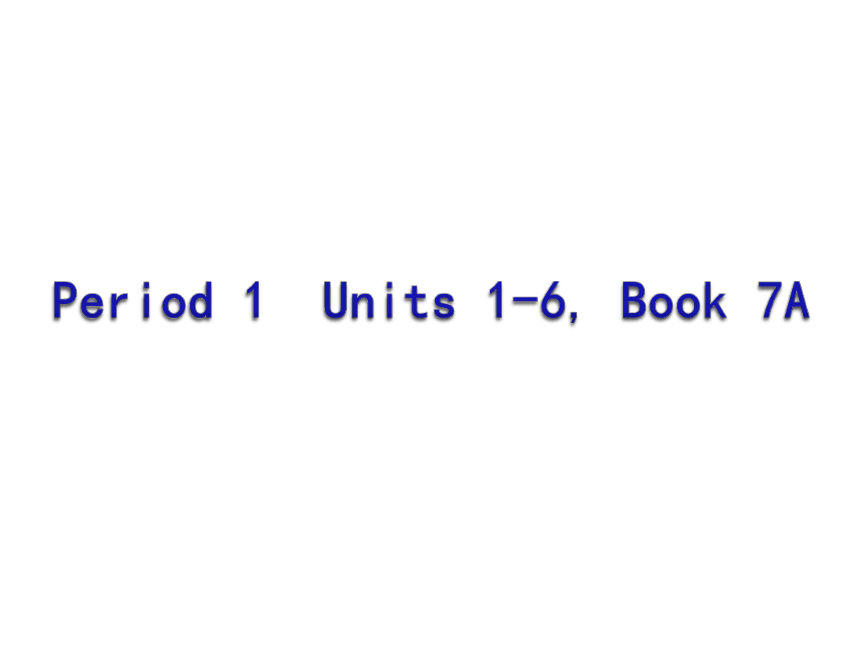
|
|
| 格式 | zip | ||
| 文件大小 | 322.2KB | ||
| 资源类型 | 教案 | ||
| 版本资源 | 通用版 | ||
| 科目 | 英语 | ||
| 更新时间 | 2012-03-06 00:00:00 | ||
图片预览

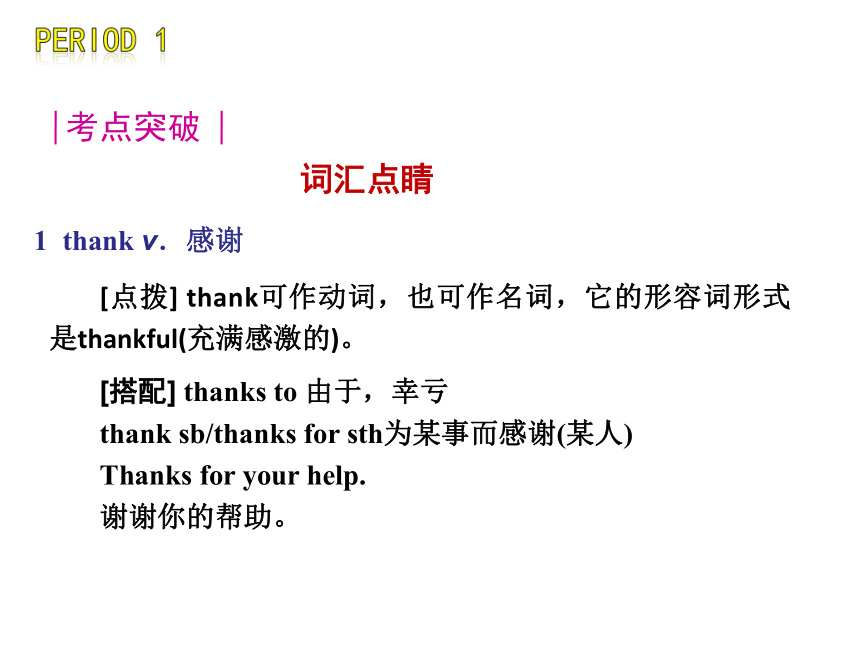
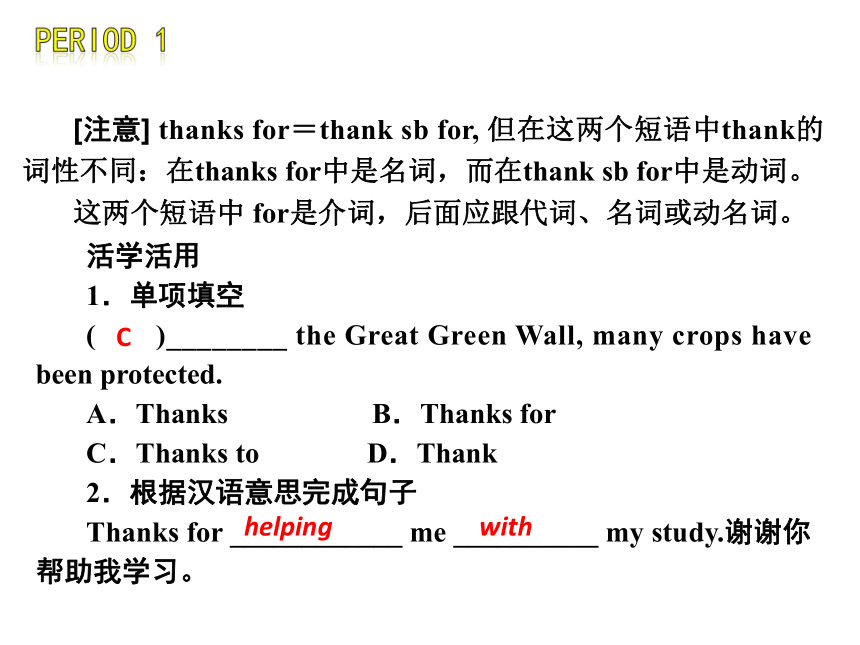
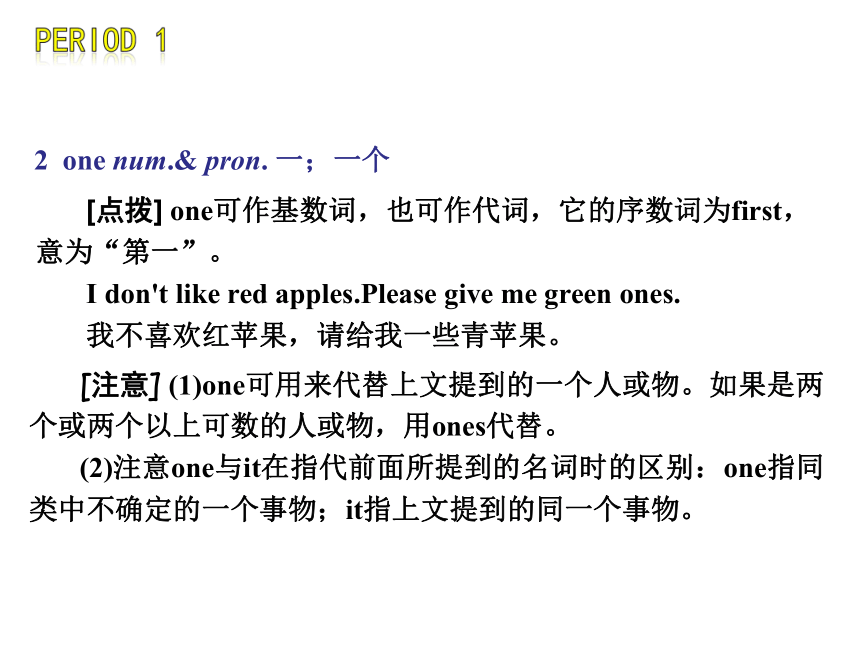
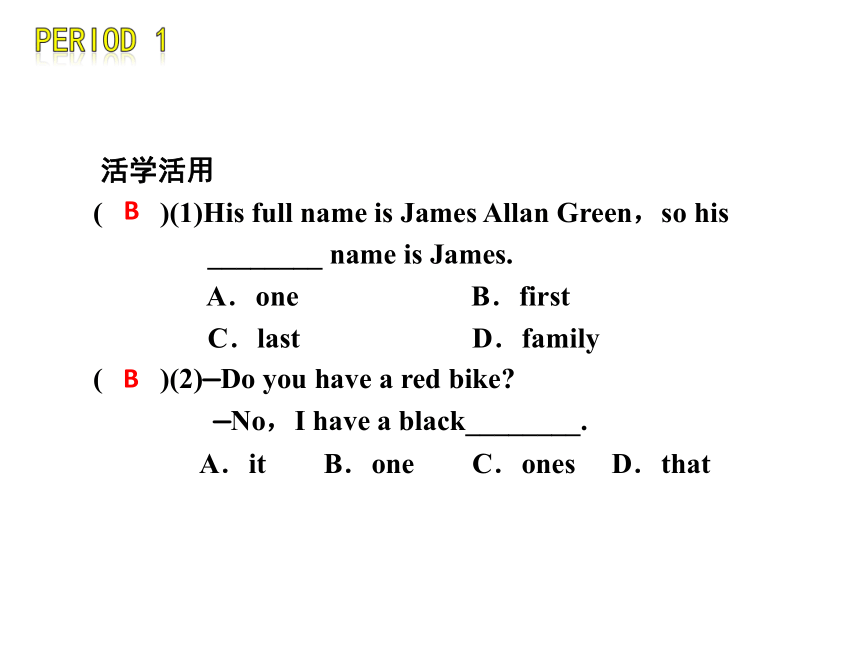
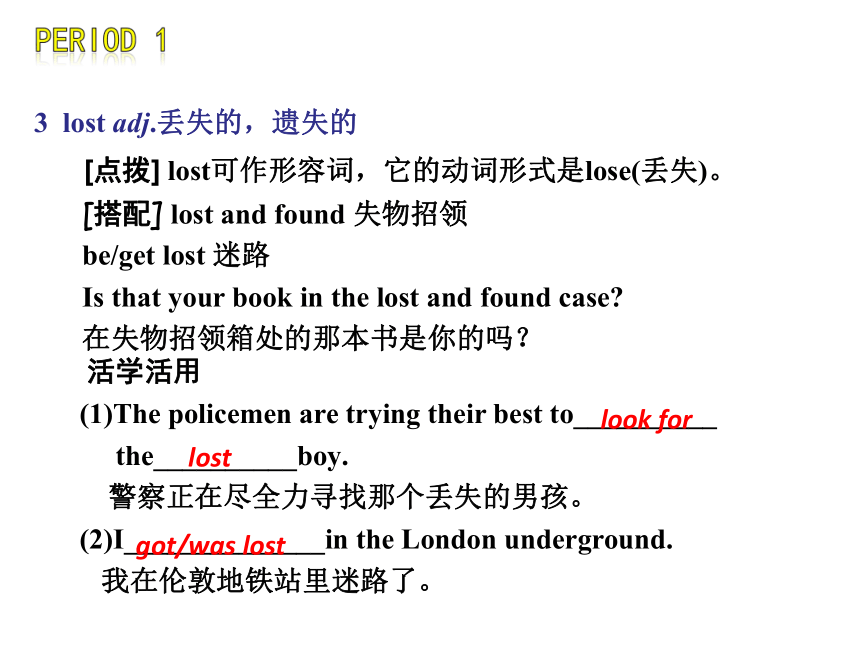
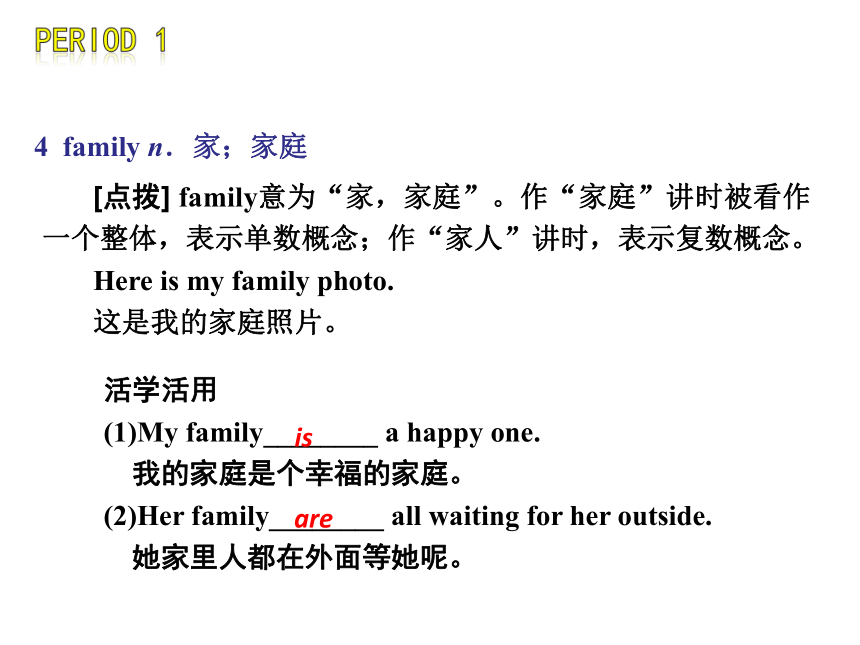
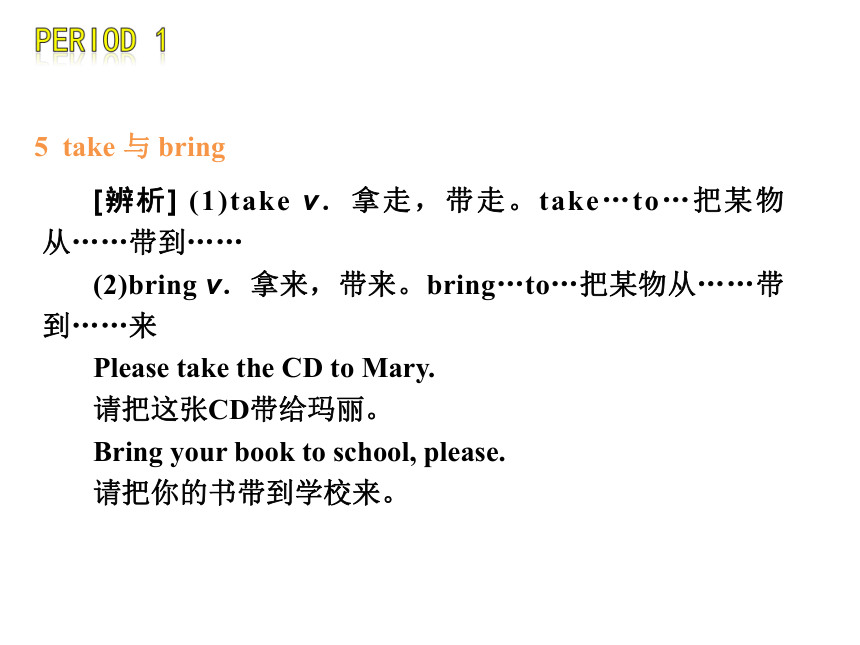
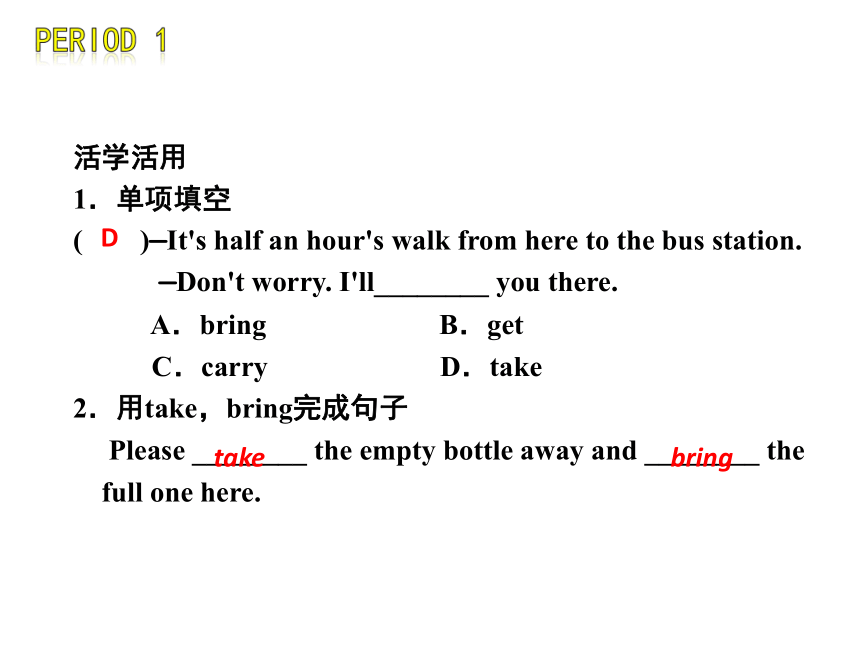
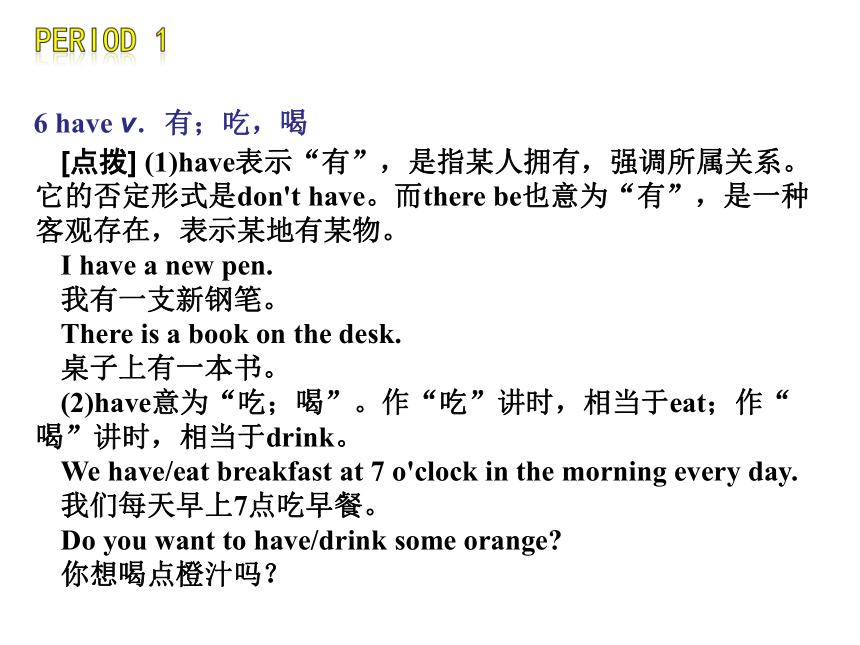
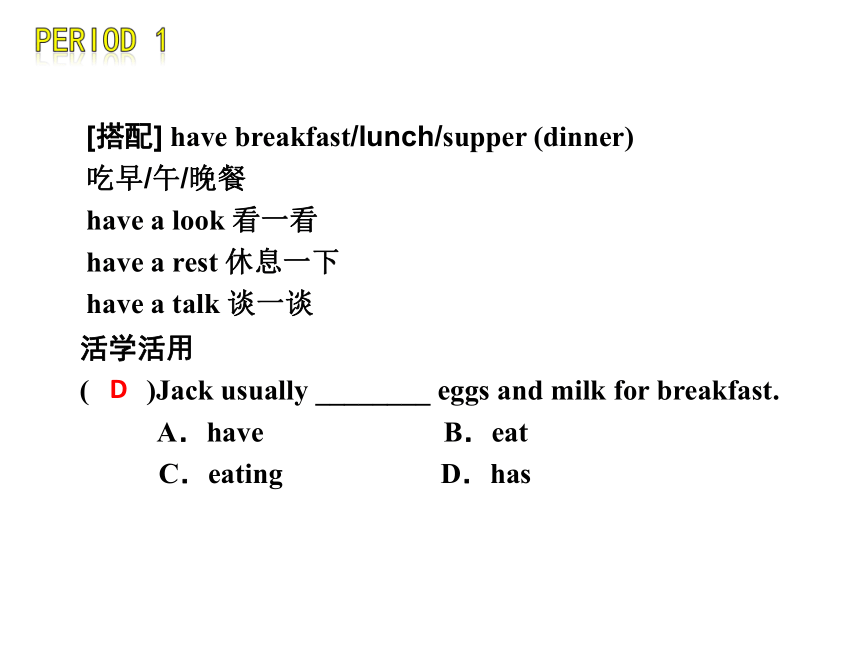
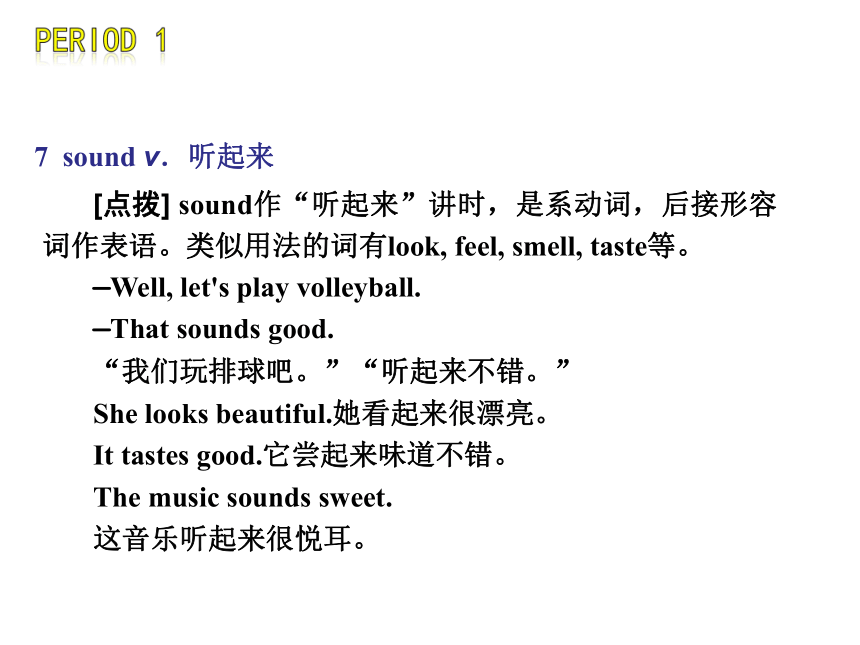
文档简介
(共38张PPT)
·吉林省专用
考点突破
·吉林省专用
词汇点睛
1 thank v.感谢
[点拨] thank可作动词,也可作名词,它的形容词形式是thankful(充满感激的)。
[搭配] thanks to 由于,幸亏
thank sb/thanks for sth为某事而感谢(某人)
Thanks for your help.
谢谢你的帮助。
·吉林省专用
[注意] thanks for=thank sb for, 但在这两个短语中thank的词性不同:在thanks for中是名词,而在thank sb for中是动词。
这两个短语中 for是介词,后面应跟代词、名词或动名词。
活学活用
1.单项填空
( )________ the Great Green Wall, many crops have been protected.
A.Thanks B.Thanks for
C.Thanks to D.Thank
2.根据汉语意思完成句子
Thanks for ____________ me __________ my study.谢谢你帮助我学习。
C
helping
with
·吉林省专用
2 one num.& pron. 一;一个
[点拨] one可作基数词,也可作代词,它的序数词为first,意为“第一”。
I don't like red apples.Please give me green ones.
我不喜欢红苹果,请给我一些青苹果。
[注意] (1)one可用来代替上文提到的一个人或物。如果是两个或两个以上可数的人或物,用ones代替。
(2)注意one与it在指代前面所提到的名词时的区别:one指同类中不确定的一个事物;it指上文提到的同一个事物。
·吉林省专用
活学活用
( )(1)His full name is James Allan Green,so his
________ name is James.
A.one B.first
C.last D.family
( )(2)—Do you have a red bike
—No,I have a black________.
A.it B.one C.ones D.that
B
B
·吉林省专用
3 lost adj.丢失的,遗失的
[点拨] lost可作形容词,它的动词形式是lose(丢失)。
[搭配] lost and found 失物招领
be/get lost 迷路
Is that your book in the lost and found case
在失物招领箱处的那本书是你的吗?
活学活用
(1)The policemen are trying their best to__________
the__________boy.
警察正在尽全力寻找那个丢失的男孩。
(2)I______________in the London underground.
我在伦敦地铁站里迷路了。
look for
lost
got/was lost
·吉林省专用
4 family n.家;家庭
[点拨] family意为“家,家庭”。作“家庭”讲时被看作一个整体,表示单数概念;作“家人”讲时,表示复数概念。
Here is my family photo.
这是我的家庭照片。
活学活用
(1)My family________ a happy one.
我的家庭是个幸福的家庭。
(2)Her family________ all waiting for her outside.
她家里人都在外面等她呢。
is
are
·吉林省专用
5 take 与 bring
[辨析] (1)take v.拿走,带走。take…to…把某物从……带到……
(2)bring v.拿来,带来。bring…to…把某物从……带到……来
Please take the CD to Mary.
请把这张CD带给玛丽。
Bring your book to school, please.
请把你的书带到学校来。
·吉林省专用
活学活用
1.单项填空
( )—It's half an hour's walk from here to the bus station.
—Don't worry. I'll________ you there.
A.bring B.get
C.carry D.take
2.用take,bring完成句子
Please ________ the empty bottle away and ________ the
full one here.
D
take
bring
·吉林省专用
6 have v.有;吃,喝
[点拨] (1)have表示“有”,是指某人拥有,强调所属关系。它的否定形式是don't have。而there be也意为“有”,是一种客观存在,表示某地有某物。
I have a new pen.
我有一支新钢笔。
There is a book on the desk.
桌子上有一本书。
(2)have意为“吃;喝”。作“吃”讲时,相当于eat;作“ 喝”讲时,相当于drink。
We have/eat breakfast at 7 o'clock in the morning every day.
我们每天早上7点吃早餐。
Do you want to have/drink some orange
你想喝点橙汁吗?
·吉林省专用
[搭配] have breakfast/lunch/supper (dinner)
吃早/午/晚餐
have a look 看一看
have a rest 休息一下
have a talk 谈一谈
活学活用
( )Jack usually ________ eggs and milk for breakfast.
A.have B.eat
C.eating D.has
D
·吉林省专用
7 sound v.听起来
[点拨] sound作“听起来”讲时,是系动词,后接形容词作表语。类似用法的词有look, feel, smell, taste等。
—Well, let's play volleyball.
—That sounds good.
“我们玩排球吧。”“听起来不错。”
She looks beautiful.她看起来很漂亮。
It tastes good.它尝起来味道不错。
The music sounds sweet.
这音乐听起来很悦耳。
·吉林省专用
活学活用
( )—Do you like the chicken soup?
—Yes, it________ nice.
A.is tasted B.is tasting
C.taste D.tastes
D
·吉林省专用
8 some与any
[辨析] (1)some意为“若干;一些”,常用于肯定句中,作主语、宾语或定语。作定语时,它可以修饰可数名词的复数,也可以修饰不可数名词。
(2)any意为“一些;任何”,常用于否定句和疑问句中,也可以用在条件状语从句中;作定语时,它可以修饰可数名词的复数,也可以修饰不可数名词。
[注意] (1)some有时也用在疑问句中,表示希望得到肯定回答。
(2)any也可以用于肯定句,这时它的意思是“任何”,而不是“一些”。
·吉林省专用
活学活用
(1)Can I have ________ meat, Mum?
妈妈,我可以吃些肉吗?
(2)________ man knows that.
任何人都知道那件事。
(3)I don't have ________ ink now.
现在我没有墨水了。
some
Any
any
·吉林省专用
9 at, in与on
[辨析] (1)at在……(里面或附近)。后接较小的地点,如:at the bus stop,at home。at还可以表示“在……(点,刻)”,如:at 10:00。
(2)in在……里面。后接较大的地点,如:in China,in the world。
(3)on在……上。表示在一个平面上,如:on the farm,on the blackboard。在表示范围时,表示互相接壤的两个地方。而在表示不接壤的两个地方时,用to。
·吉林省专用
活学活用
( )(1)It's not always necessary to look up new
words________ the dictionary while reading.
A.at B.in C.on D.by
( )(2)Do you know that Fujian is________ the west
of Taiwan
A.to B.in C.on D.at
B
A
·吉林省专用
10 family name 姓氏
[点拨] 英、美国家姓名结构:first/given name+family/last name
中国人姓名结构:family name+given name
—What's your name, please
—My name is Bill Smith.Smith is my family name and Bill is my given name.
“请问你叫什么名字?”“我叫比尔·史密斯。史密斯是我的姓,比尔是我的名。”
·吉林省专用
活学活用
( )(1)In western countries,family names
always come________ given names.
A.before B.after C.from
( )(2)My pen friend's name is James Robert.So
his given name is________.
A.James B.Robert
C.James Robert
B
A
·吉林省专用
句型透视
1 My name's Gina.我叫吉娜。
[点拨] my 为形容词性物主代词,与名词连用,在句中作定语,其用法与形容词相似。mine 是名词性物主代词,相当于形容词性物主代词加上名词,和名词的用法相同,其后不能再接名词。
[拓展] my 的主格是I,宾格是me,主格在句中常作主语;宾格常用作宾语,放在动词或介词后面。
·吉林省专用
活学活用
( )(1)This isn't ________pencil. ________ is blue.
A.my; My B.my; Mine
C.mine; My D.mine; Mine
( )(2)Peter and Bill are brothers. ________ are good
friends.
A.Them B.Their
C.Theirs D.They
D
B
·吉林省专用
2 Nice to meet you!见到你很高兴!
[点拨] 此句常用在人们初次见面的场合。其应答语为:Nice to meet you, too.(见到你也很高兴。)
[拓展] 在同一场合中,还可以用How do you do?来打招呼,其应答语也是How do you do
·吉林省专用
3 Excuse me, Sonia.打扰了,索尼娅。
[点拨] Excuse me意为“请原谅;对不起;劳驾”,常用于与陌生人搭话,打断别人说话等场合,一般在事前请他人帮忙或需要打扰别人时使用。
Excuse me. Which is the way to the park
打扰一下,去公园怎么走?
[拓展] I'm sorry./Sorry.意为“对不起;抱歉”,一般用于事后对所犯错误或不能满足对方要求等表示歉意。
I'm sorry. I lost your ruler.
对不起,我把你的尺子弄丢了。
·吉林省专用
活学活用
( )________. Can I use your car?
A.I'm sorry B.Excuse me
C.Thank you D.That's OK
B
·吉林省专用
4 Call Alan at 495 3539.请拨Alan的电话495 3539。
[句型] “call sb at+电话号码”表示“拨……号码找某人”。
[点拨] 这是一个祈使句。祈使句变否定句时在前面加Don't。
Please call the police at 110 if you are in trouble.
如果遇到了麻烦,你可以拨打110找警察。
Don't call him in the morning.
不要在早晨给他打电话。
[拓展] call 还有“拜访”的意思,常用搭配有:
call on sb; call at sp
·吉林省专用
5 Let's play soccer.我们踢足球吧。
[点拨] let sb do sth 是祈使句结构,表示“让某人做某事”,用于提出建议或征求意见。回答时,如果同意,可以说OK.或All right.等。如不同意,则说Sorry, I….或No, let's….其中,sb如果是人称代词,要用宾格形式,动词用原形。
·吉林省专用
[注意] let's相当于let us。当let后面的人称代词为us时,let us可以缩写成let's,但两者的实际含义并不相同。let's用来表示提建议,建议听话者与说话者共同做某事;let us则用来表示请求,即说话者向听话者请求要去做某事。
Tom, let's go to school.
汤姆,咱们上学去吧。(两人一起做此事)
Let him come in.让他进来。
Please let us clean the classroom.
请让我们打扫教室吧。(“听话者”并不参与此事)
·吉林省专用
活学活用
( )Let's go and________ her brother.
A.help B.to help
C.helping D.helps
A
·吉林省专用
高频考点
( )1.I think ________ is a student.
A.she B.her
C.him D.I
( )2.This is ________ eraser. That is ________pencil.
A.a; an B.an; a
C.a; a D.an; an
( )3.Do you know the boy ________ a white
T shirt
A.on B.at
C.with D.in
D
A
B
·吉林省专用
( )4.I can see many ________ in these ________.
A.tomatoes; photoes
B.tomatoes; photos
C.tomatos; photoes
D.tomatos; photos
( )5.He ________ have ________ soccer balls.
A.doesn't; some B.doesn't; any
C.don't; some D.don't; any
B
B
基础过关
·吉林省专用
词汇专练
Ⅰ. 根据句意及首字母提示完成单词
1. After four morning classes, I have l_____ at school.
2. I have m____ friends. They are very nice.
3. My father and mother's d ________ is my sister.
4. —What f _____ do you like
—I like apples,bananas and pears.
5. This is Alan Millier . His f ______ name is Millier.
unch
any
aughter
ruits
amily
·吉林省专用
6. He doesn't like chicken,b ___ he likes eggs.
7. I c ___ spell the word “drawer”.
8. —What v__________ does your mother like
—Carrots and cabbages.
9. Please c ___ Tim at 345—903.
10. Bob's telephone n _______ is 764—215.
ut
an
egetables
all
umber
·吉林省专用
Ⅱ. 从方框内选词,并用其适当形式填空
1.Tom's father doesn't let him ________ TV.
2.He can play the piano very _____.
3.There is a set of ______ on the dresser.
4.Sandra is a ________ star; she runs very fast.
5.He never eats junk food, so he is very ________.
watch
well
keys
running
healthy
·吉林省专用
Ⅲ. 用所给词的适当形式填空
1. His grandparents like __________(tomato) very much.
2. The boys play basketball _____(good).
3. Jane and Helen_____ (runner) every morning.
4. That's an__________ (interest) game.
5. This is my _____(one) time to visit Beijing.
6. This is Tom. He is ____(I) brother.
7. ________(that) are my family photos.
8. It's good for you to eat some _______(pear).
9. Dale and Bob are my good friends. I like ______(they).
10. Here____ (be) three video tapes.
tomatoes
well
run
interesting
first
my
Those
pears
them
are
·吉林省专用
Ⅰ. 根据汉语意思完成下列句子,每空一词
1. 咱们玩电子游戏吧。
______ ______computer games.
2. 你有学生证吗?
___you________ a student ID card
3. 这里的许多人认识李先生。
______ ____ people here know Mr Li.
4. 瞧!一串钥匙在抽屉里。
Look!___ ____ ___keys is in the drawer.
5. 我饿了。请给我带一些食物来。
I'm hungry. Please______ some food____ me.
句型专练
Let's
play
have
A
set
Do
Lots
of
of
bring
for
·吉林省专用
6. 多谢你的帮助。
________ _____your help.
7. 这个用英语怎么表达?
________this ____ ________?
8. 我们需要每天做运动。
We need to____ _______ ______ _____.
9. 你如何拼写“帽子”这个单词?
______ ____ _____ _____ the word “hat”?
10. 这两位是我的父母。
________ ____my ________.
Thanks
for
What's
sports
every
in
English
play
day
How
do
you
spell
These
are
parents
·吉林省专用
Ⅱ. 句型转换
1. My brother has lunch at school.(改为否定句)
My brother________ ______lunch at school.
2. His cousin plays sports every day.(改为一般疑问句)
______his cousin_____ sports every day
3. Her bag is on the sofa.(对画线部分提问)
________ ____her bag
4. The girl has a_new_CD.(对画线部分提问)
______ ______the girl______?
5. They have many oranges.(用Jim 替换They)
Jim_____ many oranges.
doesn't
have
Does
play
Where
is
What
does
have
has
·吉林省专用
look,see,watch与read
(1)look强调看的动作,可单独成句;后接宾语时加介词at;
作系动词时表示“看起来”,后接形容词作表语。
(2)see强调“看”的结果(看见……);常用于表示“看电影 / 看病 /
……”;也可表示“理解;考虑”,如:I see. 我明白了。
(3)watch强调“(聚精会神地)看;注视”;常用于表示“看电视 /
看比赛 / ……”;也可以作名词,意为“手表”。其后接宾语补
足语时与see的用法相同。
(4)read强调“读”,常用于表示“看书 / 看报刊杂志 / ……”。
每日一辨
·吉林省专用
考点突破
·吉林省专用
词汇点睛
1 thank v.感谢
[点拨] thank可作动词,也可作名词,它的形容词形式是thankful(充满感激的)。
[搭配] thanks to 由于,幸亏
thank sb/thanks for sth为某事而感谢(某人)
Thanks for your help.
谢谢你的帮助。
·吉林省专用
[注意] thanks for=thank sb for, 但在这两个短语中thank的词性不同:在thanks for中是名词,而在thank sb for中是动词。
这两个短语中 for是介词,后面应跟代词、名词或动名词。
活学活用
1.单项填空
( )________ the Great Green Wall, many crops have been protected.
A.Thanks B.Thanks for
C.Thanks to D.Thank
2.根据汉语意思完成句子
Thanks for ____________ me __________ my study.谢谢你帮助我学习。
C
helping
with
·吉林省专用
2 one num.& pron. 一;一个
[点拨] one可作基数词,也可作代词,它的序数词为first,意为“第一”。
I don't like red apples.Please give me green ones.
我不喜欢红苹果,请给我一些青苹果。
[注意] (1)one可用来代替上文提到的一个人或物。如果是两个或两个以上可数的人或物,用ones代替。
(2)注意one与it在指代前面所提到的名词时的区别:one指同类中不确定的一个事物;it指上文提到的同一个事物。
·吉林省专用
活学活用
( )(1)His full name is James Allan Green,so his
________ name is James.
A.one B.first
C.last D.family
( )(2)—Do you have a red bike
—No,I have a black________.
A.it B.one C.ones D.that
B
B
·吉林省专用
3 lost adj.丢失的,遗失的
[点拨] lost可作形容词,它的动词形式是lose(丢失)。
[搭配] lost and found 失物招领
be/get lost 迷路
Is that your book in the lost and found case
在失物招领箱处的那本书是你的吗?
活学活用
(1)The policemen are trying their best to__________
the__________boy.
警察正在尽全力寻找那个丢失的男孩。
(2)I______________in the London underground.
我在伦敦地铁站里迷路了。
look for
lost
got/was lost
·吉林省专用
4 family n.家;家庭
[点拨] family意为“家,家庭”。作“家庭”讲时被看作一个整体,表示单数概念;作“家人”讲时,表示复数概念。
Here is my family photo.
这是我的家庭照片。
活学活用
(1)My family________ a happy one.
我的家庭是个幸福的家庭。
(2)Her family________ all waiting for her outside.
她家里人都在外面等她呢。
is
are
·吉林省专用
5 take 与 bring
[辨析] (1)take v.拿走,带走。take…to…把某物从……带到……
(2)bring v.拿来,带来。bring…to…把某物从……带到……来
Please take the CD to Mary.
请把这张CD带给玛丽。
Bring your book to school, please.
请把你的书带到学校来。
·吉林省专用
活学活用
1.单项填空
( )—It's half an hour's walk from here to the bus station.
—Don't worry. I'll________ you there.
A.bring B.get
C.carry D.take
2.用take,bring完成句子
Please ________ the empty bottle away and ________ the
full one here.
D
take
bring
·吉林省专用
6 have v.有;吃,喝
[点拨] (1)have表示“有”,是指某人拥有,强调所属关系。它的否定形式是don't have。而there be也意为“有”,是一种客观存在,表示某地有某物。
I have a new pen.
我有一支新钢笔。
There is a book on the desk.
桌子上有一本书。
(2)have意为“吃;喝”。作“吃”讲时,相当于eat;作“ 喝”讲时,相当于drink。
We have/eat breakfast at 7 o'clock in the morning every day.
我们每天早上7点吃早餐。
Do you want to have/drink some orange
你想喝点橙汁吗?
·吉林省专用
[搭配] have breakfast/lunch/supper (dinner)
吃早/午/晚餐
have a look 看一看
have a rest 休息一下
have a talk 谈一谈
活学活用
( )Jack usually ________ eggs and milk for breakfast.
A.have B.eat
C.eating D.has
D
·吉林省专用
7 sound v.听起来
[点拨] sound作“听起来”讲时,是系动词,后接形容词作表语。类似用法的词有look, feel, smell, taste等。
—Well, let's play volleyball.
—That sounds good.
“我们玩排球吧。”“听起来不错。”
She looks beautiful.她看起来很漂亮。
It tastes good.它尝起来味道不错。
The music sounds sweet.
这音乐听起来很悦耳。
·吉林省专用
活学活用
( )—Do you like the chicken soup?
—Yes, it________ nice.
A.is tasted B.is tasting
C.taste D.tastes
D
·吉林省专用
8 some与any
[辨析] (1)some意为“若干;一些”,常用于肯定句中,作主语、宾语或定语。作定语时,它可以修饰可数名词的复数,也可以修饰不可数名词。
(2)any意为“一些;任何”,常用于否定句和疑问句中,也可以用在条件状语从句中;作定语时,它可以修饰可数名词的复数,也可以修饰不可数名词。
[注意] (1)some有时也用在疑问句中,表示希望得到肯定回答。
(2)any也可以用于肯定句,这时它的意思是“任何”,而不是“一些”。
·吉林省专用
活学活用
(1)Can I have ________ meat, Mum?
妈妈,我可以吃些肉吗?
(2)________ man knows that.
任何人都知道那件事。
(3)I don't have ________ ink now.
现在我没有墨水了。
some
Any
any
·吉林省专用
9 at, in与on
[辨析] (1)at在……(里面或附近)。后接较小的地点,如:at the bus stop,at home。at还可以表示“在……(点,刻)”,如:at 10:00。
(2)in在……里面。后接较大的地点,如:in China,in the world。
(3)on在……上。表示在一个平面上,如:on the farm,on the blackboard。在表示范围时,表示互相接壤的两个地方。而在表示不接壤的两个地方时,用to。
·吉林省专用
活学活用
( )(1)It's not always necessary to look up new
words________ the dictionary while reading.
A.at B.in C.on D.by
( )(2)Do you know that Fujian is________ the west
of Taiwan
A.to B.in C.on D.at
B
A
·吉林省专用
10 family name 姓氏
[点拨] 英、美国家姓名结构:first/given name+family/last name
中国人姓名结构:family name+given name
—What's your name, please
—My name is Bill Smith.Smith is my family name and Bill is my given name.
“请问你叫什么名字?”“我叫比尔·史密斯。史密斯是我的姓,比尔是我的名。”
·吉林省专用
活学活用
( )(1)In western countries,family names
always come________ given names.
A.before B.after C.from
( )(2)My pen friend's name is James Robert.So
his given name is________.
A.James B.Robert
C.James Robert
B
A
·吉林省专用
句型透视
1 My name's Gina.我叫吉娜。
[点拨] my 为形容词性物主代词,与名词连用,在句中作定语,其用法与形容词相似。mine 是名词性物主代词,相当于形容词性物主代词加上名词,和名词的用法相同,其后不能再接名词。
[拓展] my 的主格是I,宾格是me,主格在句中常作主语;宾格常用作宾语,放在动词或介词后面。
·吉林省专用
活学活用
( )(1)This isn't ________pencil. ________ is blue.
A.my; My B.my; Mine
C.mine; My D.mine; Mine
( )(2)Peter and Bill are brothers. ________ are good
friends.
A.Them B.Their
C.Theirs D.They
D
B
·吉林省专用
2 Nice to meet you!见到你很高兴!
[点拨] 此句常用在人们初次见面的场合。其应答语为:Nice to meet you, too.(见到你也很高兴。)
[拓展] 在同一场合中,还可以用How do you do?来打招呼,其应答语也是How do you do
·吉林省专用
3 Excuse me, Sonia.打扰了,索尼娅。
[点拨] Excuse me意为“请原谅;对不起;劳驾”,常用于与陌生人搭话,打断别人说话等场合,一般在事前请他人帮忙或需要打扰别人时使用。
Excuse me. Which is the way to the park
打扰一下,去公园怎么走?
[拓展] I'm sorry./Sorry.意为“对不起;抱歉”,一般用于事后对所犯错误或不能满足对方要求等表示歉意。
I'm sorry. I lost your ruler.
对不起,我把你的尺子弄丢了。
·吉林省专用
活学活用
( )________. Can I use your car?
A.I'm sorry B.Excuse me
C.Thank you D.That's OK
B
·吉林省专用
4 Call Alan at 495 3539.请拨Alan的电话495 3539。
[句型] “call sb at+电话号码”表示“拨……号码找某人”。
[点拨] 这是一个祈使句。祈使句变否定句时在前面加Don't。
Please call the police at 110 if you are in trouble.
如果遇到了麻烦,你可以拨打110找警察。
Don't call him in the morning.
不要在早晨给他打电话。
[拓展] call 还有“拜访”的意思,常用搭配有:
call on sb; call at sp
·吉林省专用
5 Let's play soccer.我们踢足球吧。
[点拨] let sb do sth 是祈使句结构,表示“让某人做某事”,用于提出建议或征求意见。回答时,如果同意,可以说OK.或All right.等。如不同意,则说Sorry, I….或No, let's….其中,sb如果是人称代词,要用宾格形式,动词用原形。
·吉林省专用
[注意] let's相当于let us。当let后面的人称代词为us时,let us可以缩写成let's,但两者的实际含义并不相同。let's用来表示提建议,建议听话者与说话者共同做某事;let us则用来表示请求,即说话者向听话者请求要去做某事。
Tom, let's go to school.
汤姆,咱们上学去吧。(两人一起做此事)
Let him come in.让他进来。
Please let us clean the classroom.
请让我们打扫教室吧。(“听话者”并不参与此事)
·吉林省专用
活学活用
( )Let's go and________ her brother.
A.help B.to help
C.helping D.helps
A
·吉林省专用
高频考点
( )1.I think ________ is a student.
A.she B.her
C.him D.I
( )2.This is ________ eraser. That is ________pencil.
A.a; an B.an; a
C.a; a D.an; an
( )3.Do you know the boy ________ a white
T shirt
A.on B.at
C.with D.in
D
A
B
·吉林省专用
( )4.I can see many ________ in these ________.
A.tomatoes; photoes
B.tomatoes; photos
C.tomatos; photoes
D.tomatos; photos
( )5.He ________ have ________ soccer balls.
A.doesn't; some B.doesn't; any
C.don't; some D.don't; any
B
B
基础过关
·吉林省专用
词汇专练
Ⅰ. 根据句意及首字母提示完成单词
1. After four morning classes, I have l_____ at school.
2. I have m____ friends. They are very nice.
3. My father and mother's d ________ is my sister.
4. —What f _____ do you like
—I like apples,bananas and pears.
5. This is Alan Millier . His f ______ name is Millier.
unch
any
aughter
ruits
amily
·吉林省专用
6. He doesn't like chicken,b ___ he likes eggs.
7. I c ___ spell the word “drawer”.
8. —What v__________ does your mother like
—Carrots and cabbages.
9. Please c ___ Tim at 345—903.
10. Bob's telephone n _______ is 764—215.
ut
an
egetables
all
umber
·吉林省专用
Ⅱ. 从方框内选词,并用其适当形式填空
1.Tom's father doesn't let him ________ TV.
2.He can play the piano very _____.
3.There is a set of ______ on the dresser.
4.Sandra is a ________ star; she runs very fast.
5.He never eats junk food, so he is very ________.
watch
well
keys
running
healthy
·吉林省专用
Ⅲ. 用所给词的适当形式填空
1. His grandparents like __________(tomato) very much.
2. The boys play basketball _____(good).
3. Jane and Helen_____ (runner) every morning.
4. That's an__________ (interest) game.
5. This is my _____(one) time to visit Beijing.
6. This is Tom. He is ____(I) brother.
7. ________(that) are my family photos.
8. It's good for you to eat some _______(pear).
9. Dale and Bob are my good friends. I like ______(they).
10. Here____ (be) three video tapes.
tomatoes
well
run
interesting
first
my
Those
pears
them
are
·吉林省专用
Ⅰ. 根据汉语意思完成下列句子,每空一词
1. 咱们玩电子游戏吧。
______ ______computer games.
2. 你有学生证吗?
___you________ a student ID card
3. 这里的许多人认识李先生。
______ ____ people here know Mr Li.
4. 瞧!一串钥匙在抽屉里。
Look!___ ____ ___keys is in the drawer.
5. 我饿了。请给我带一些食物来。
I'm hungry. Please______ some food____ me.
句型专练
Let's
play
have
A
set
Do
Lots
of
of
bring
for
·吉林省专用
6. 多谢你的帮助。
________ _____your help.
7. 这个用英语怎么表达?
________this ____ ________?
8. 我们需要每天做运动。
We need to____ _______ ______ _____.
9. 你如何拼写“帽子”这个单词?
______ ____ _____ _____ the word “hat”?
10. 这两位是我的父母。
________ ____my ________.
Thanks
for
What's
sports
every
in
English
play
day
How
do
you
spell
These
are
parents
·吉林省专用
Ⅱ. 句型转换
1. My brother has lunch at school.(改为否定句)
My brother________ ______lunch at school.
2. His cousin plays sports every day.(改为一般疑问句)
______his cousin_____ sports every day
3. Her bag is on the sofa.(对画线部分提问)
________ ____her bag
4. The girl has a_new_CD.(对画线部分提问)
______ ______the girl______?
5. They have many oranges.(用Jim 替换They)
Jim_____ many oranges.
doesn't
have
Does
play
Where
is
What
does
have
has
·吉林省专用
look,see,watch与read
(1)look强调看的动作,可单独成句;后接宾语时加介词at;
作系动词时表示“看起来”,后接形容词作表语。
(2)see强调“看”的结果(看见……);常用于表示“看电影 / 看病 /
……”;也可表示“理解;考虑”,如:I see. 我明白了。
(3)watch强调“(聚精会神地)看;注视”;常用于表示“看电视 /
看比赛 / ……”;也可以作名词,意为“手表”。其后接宾语补
足语时与see的用法相同。
(4)read强调“读”,常用于表示“看书 / 看报刊杂志 / ……”。
每日一辨
